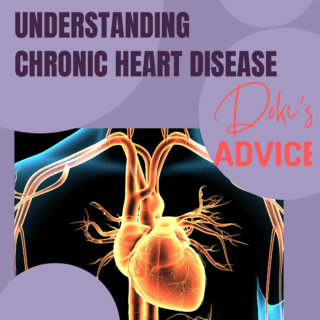Understanding Chronic and Coronary Heart Disease:
What are Chronic Heart Disease and Coronary Heart Disease?
Chronic heart disease (CHD), often referred to as cardiovascular disease, is a long-term condition that affects the heart and blood vessels. It commonly results from narrowed or blocked arteries, leading to reduced blood flow to the heart. This can increase the risk of heart attacks, heart failure, arrhythmias, and other complications. CHD is a leading cause of death worldwide and requires long-term management to prevent severe outcomes.
Coronary heart disease, also known as ischemic heart disease, is a specific type of chronic heart disease that results from plaque buildup in the coronary arteries. This buildup restricts blood flow to the heart muscle, leading to conditions such as angina (chest pain) and heart attacks. While all coronary heart disease is chronic, not all chronic heart disease is limited to coronary artery issues; other types may include heart valve disease and arrhythmias.
Types of coronary heart diseases:
- Acute coronary disease (ACS): sudden heart problems, like heart attacks
- Chronic coronary Syndrome (CCS): Long-term or stable heart related issues
- Asymptomatic CHD: No symptoms despite presence of the disease
How are Chronic and Coronary Heart Disease Identified and Diagnosed?
The diagnosis of these conditions involves several steps, including medical history assessment, physical examination, and diagnostic tests. Some of the common ways to identify CHD and coronary heart disease include:
Symptoms – These conditions often present with symptoms such as:
- Chest pain or discomfort (angina)
- Shortness of breath either at rest or during physical activity
- Fatigue
- Swelling in the legs, ankles, or feet
- Irregular heartbeat
Medical Tests – To confirm a diagnosis, doctors may use:
- Electrocardiogram (ECG/EKG): Measures electrical activity in the heart to detect irregularities.
- Echocardiogram: Uses ultrasound to visualize heart function and structure.
- Stress Test: Evaluates how the heart performs under physical exertion.
- Coronary Angiography: Uses contrast dye and X-rays to detect blockages in the coronary arteries.
- Blood Tests: Check cholesterol, blood sugar, and markers of heart disease.
- Cardiac catheterisation
How are Chronic and Coronary Heart Disease Treated?
The treatment of these conditions depends on the severity of the disease and the patient’s overall health. Treatment options include:
Lifestyle Changes:
- Eating a heart-healthy diet rich in fruits, vegetables, whole grains, and lean proteins.
- Engaging in regular physical activity (at least 30 minutes a day, most days of the week).
- Maintaining a healthy weight.
- Avoiding smoking and excessive alcohol consumption.
- Managing stress through relaxation techniques and adequate sleep.
Medications:
- Statins: Lower cholesterol levels to prevent artery blockages.
- Beta-blockers: Reduce heart rate and blood pressure to ease strain on the heart.
- ACE Inhibitors & ARBs: Help relax blood vessels to improve blood flow.
- Aspirin or Antiplatelet Drugs: Prevent blood clot formation.
- Diuretics: Reduce fluid buildup in patients with heart failure.
- Long acting-nitrates: Dilating coronary arteries and reducing preload hence improving oxygen supply to the heart.
- Ranolazine: reduce myocardial oxygen demand (this is just a symptomatic therapy).
- Ivabradine: reduces heart rate without affecting blood pressure or contractility.
- Blood thinners
Medical Procedures and Surgery:
- Angioplasty and Stenting: A minimally invasive procedure to open blocked arteries.
- Coronary Artery Bypass Grafting (CABG): A surgical procedure that improves blood flow to the heart by bypassing blocked arteries.
- Implantable Devices: Pacemakers or defibrillators may be used to manage arrhythmias.
How to Prevent Chronic and Coronary Heart Disease
- Preventing heart disease is possible by making healthy lifestyle choices and managing risk factors. Key preventive measures include:
- Maintain a Healthy Diet: Focus on foods rich in fiber, healthy fats, and low in processed sugars and sodium.
- Exercise Regularly: Engage in activities like walking, swimming, or cycling to improve cardiovascular health.
- Control Blood Pressure and Cholesterol: Regular check-ups and necessary medications can help manage these risk factors.
- Quit Smoking: Smoking damages blood vessels and significantly increases heart disease risk.
- Manage Diabetes: Keeping blood sugar levels under control reduces damage to the heart and blood vessels.
- Reduce Stress: Practice mindfulness, yoga, or other relaxation techniques to lower stress levels.
Regular Medical Check-ups: Routine screenings help detect early signs of heart disease and take preventive action. And as usual always seek medical advice from your doctor first.

